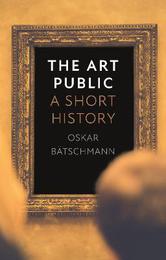
|
The Art Public: A Short History
Hardback
Main Details
| Title |
The Art Public: A Short History
|
| Authors and Contributors |
By (author) Oskar Batschmann
|
| Physical Properties |
| Format:Hardback | | Pages:248 | | Dimensions(mm): Height 216,Width 138 |
|
| Category/Genre | Art History |
|---|
| ISBN/Barcode |
9781789146943
|
| Audience | | Postgraduate, Research & Scholarly | |
|---|
| Illustrations |
53 illustrations, 30 in colour
|
|
Publishing Details |
| Publisher |
Reaktion Books
|
| Imprint |
Reaktion Books
|
| NZ Release Date |
1 October 2023 |
| Publication Country |
United Kingdom
|
Description
Although the idea of a collective audience for art - an 'art public' - is highly significant in the art world, this is the first book to enquire into the actual history of the art public. The book explores both written and pictorial evidence of its behaviour, and disentangles the connections between art production, the expectations of the audience and a work's reception. Two aspects shape the narrative: first, the transformation of the audience from passive recipient to active agent; and second, the mockery of the audience by satirists such as George Cruikshank, Thomas Rowlandson, Honore Daumier and many others. This sweeping account moves from the Greek artist Apelles to Leon Battista Alberti and Leonardo da Vinci, and from Oscar Wilde to film stars, art tourists and leading art museums and galleries worldwide.
Author Biography
Oskar Batschmann is Professor Emeritus of Early Modern Art History at the University of Bern. His books include Hans Holbein (Reaktion Books, 1997, Revised and Expanded Second Edition 2013) and Giovanni Bellini (Reaktion Books, 2007).
Reviews"The abundance of different types of sources from the antique to the present produces an astonishing history of the public. We read about artworks, as well as remarks by artists, art theorists, connoisseurs and critics, of the history of exhibitions, auctions and collections and much more. There is no other book so far with such a richness of sources and aspects concerning the public sphere. It should produce a new area of research."--Werner Busch, Freie Universitat Berlin
|